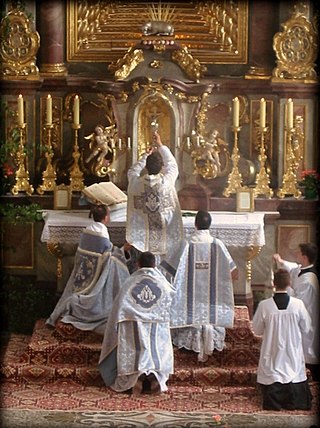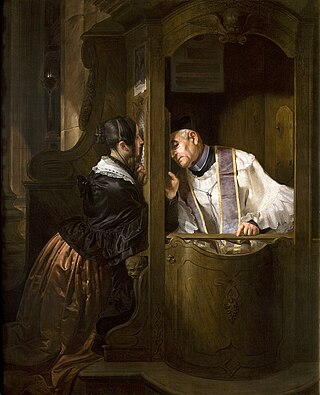
Sacrifice is the offering of material possessions or the lives of animals or humans to a deity as an act of propitiation or worship. Evidence of ritual animal sacrifice has been seen at least since ancient Hebrews and Greeks, and possibly existed before that. Evidence of ritual human sacrifice can also be found back to at least pre-Columbian civilizations of Mesoamerica as well as in European civilizations. Varieties of ritual non-human sacrifices are practiced by numerous religions today.

The Tridentine Mass, also known as the Traditional Latin Mass or the Traditional Rite, is the liturgy in the Roman Missal of the Catholic Church published from 1570 to 1962. Celebrated almost exclusively in Ecclesiastical Latin, it was the most widely used Eucharistic liturgy in the world from its issuance in 1570 until the introduction of the Mass of Paul VI.

The epiclesis refers to the invocation of one or several gods. In ancient Greek religion, the epiclesis was the epithet used as the surname given to a deity in religious contexts. The term was borrowed into the Christian tradition, where it designates the part of the Anaphora by which the priest invokes the Holy Spirit upon the Eucharistic bread and wine in some Christian churches. In most Eastern Christian traditions, the Epiclesis comes after the Anamnesis ; in the Western Rite it usually precedes. In the historic practice of the Western Christian Churches, the consecration is effected at the Words of Institution though during the rise of the Liturgical Movement, many denominations introduced an explicit epiclesis in their liturgies.

In the teaching of the Catholic Church, an indulgence is "a way to reduce the amount of punishment one has to undergo for sins". The Catechism of the Catholic Church describes an indulgence as "a remission before God of the temporal punishment due to sins whose guilt has already been forgiven, which the faithful Christian who is duly disposed gains under certain prescribed conditions through the action of the Church which, as the minister of redemption, dispenses and applies with authority the treasury of the satisfactions of Christ and all of the saints".

Absolution is a theological term for the forgiveness imparted by ordained Christian priests and experienced by Christian penitents. It is a universal feature of the historic churches of Christendom, although the theology and the practice of absolution vary between Christian denominations.

The Exsultet, also known as the Easter Proclamation, is a lengthy sung proclamation delivered before the paschal candle, ideally by a deacon, during the Easter Vigil in the Roman Rite of Mass. In the absence of a deacon, it may be sung by a priest or by a cantor. It is sung after a procession with the paschal candle before the beginning of the Liturgy of the Word. It is also used in Anglican and various Lutheran churches, as well as other Western Christian denominations.

Eucharistic discipline is the term applied to the regulations and practices associated with an individual preparing for the reception of the Eucharist. Different Christian traditions require varying degrees of preparation, which may include a period of fasting, prayer, repentance, and confession.

Eucharistic theology is a branch of Christian theology which treats doctrines concerning the Holy Eucharist, also commonly known as the Lord's Supper. It exists exclusively in Christianity and related religions, as others generally do not contain a Eucharistic ceremony.

Eucharist is the name that Catholics give to the sacrament by which, according to their belief, the body and blood of Christ are present in the bread and wine that are consecrated during the Catholic eucharistic liturgy, generally known as the Mass. The definition of the Eucharist in the 1983 Code of Canon Law as the sacrament where Christ himself "is contained, offered, and received" points to the three aspects of the Eucharist according to Catholic theology: the real presence of Christ in the Eucharist, Holy Communion, and the holy sacrifice of the Mass.
Catholic spirituality includes the various ways in which Catholics live out their Baptismal promise through prayer and action. The primary prayer of all Catholics is the Eucharistic liturgy in which they celebrate and share their faith together, in accord with Jesus' instruction: "Do this in memory of me." The Catholic bishops at the Second Vatican Council decreed that "devotions should be so drawn up that they harmonize with the liturgical seasons, accord with the sacred liturgy, are in some fashion derived from it, and lead the people to it, since, in fact, the liturgy by its very nature far surpasses any of them." In accord with this, many additional forms of prayer have developed over the centuries as means of animating one's personal Christian life, at times in gatherings with others. Each of the religious orders and congregations of the Catholic church, as well as lay groupings, has specifics to its own spirituality – its way of approaching God in prayer to foster its way of living out the Gospel.

The Mass is the central liturgical service of the Eucharist in the Catholic Church, in which bread and wine are consecrated and become the body and blood of Christ. As defined by the Church at the Council of Trent, in the Mass "the same Christ who offered himself once in a bloody manner on the altar of the cross, is present and offered in an unbloody manner". The Church describes the Mass as the "source and summit of the Christian life", and teaches that the Mass is a sacrifice, in which the sacramental bread and wine, through consecration by an ordained priest, become the sacrificial body, blood, soul, and divinity of Christ as the sacrifice on Calvary made truly present once again on the altar. The Catholic Church permits only baptised members in the state of grace to receive Christ in the Eucharist.
In Catholicism, the morning offering is a prayer said by an individual at the start of the day in order to consecrate oneself to Jesus Christ. The practice has traditionally been associated with the Apostleship of Prayer. While since 1929 the Pope has added a general and a mission intention to the traditional morning offering prayer each month, Pope Francis has restored this to the original, single monthly intention. Over time other forms of the morning offering prayer have been suggested.

Thanksgiving after Communion is a spiritual practice among Christians who believe in the Real Presence of Jesus Christ in the Communion bread, maintaining themselves in prayer for some time to thank God and especially listening in their hearts for guidance from their Divine guest. This practice was and is highly recommended by saints, theologians, and Doctors of the Church.

Prayer in the Catholic Church is "the raising of one's mind and heart to God or the requesting of good things from God." It is an act of the moral virtue of religion, which Catholic theologians identify as a part of the cardinal virtue of justice.
Mediator Dei is a papal encyclical issued by Pope Pius XII on 20 November 1947. It was the first encyclical devoted entirely to liturgy.
Good Friday Prayer can refer to any of the prayers prayed by Christians on Good Friday, the Friday before Easter, or to all such prayers collectively.
Catholic theology is the understanding of Catholic doctrine or teachings, and results from the studies of theologians. It is based on canonical scripture, and sacred tradition, as interpreted authoritatively by the magisterium of the Catholic Church. This article serves as an introduction to various topics in Catholic theology, with links to where fuller coverage is found.

Reparation is a Christian theological concept closely connected with those of atonement and satisfaction. In ascetical theology, reparation is the making of amends for insults given to God through sin, either one's own or another's. The response of man is to be reparation through adoration, prayer, and sacrifice. In Roman Catholic tradition, an act of reparation is a prayer or devotion with the intent to expiate the "sins of others", e.g. for the repair of the sin of blasphemy, the sufferings of Jesus Christ or as Acts of Reparation to the Virgin Mary.

A number of prayers to Jesus Christ exist within the Roman Catholic tradition. These prayers have diverse origins and forms. Some were attributed to visions of saints, others were handed down by tradition.
The Feast of Christ the Priest is a Roman Catholic moveable liturgical feast celebrated annually on the first Thursday after Pentecost. Approval for this feast was first granted by the Congregation for Divine Worship and the Discipline of the Sacraments in 1987. In 2012 the Congregation sent a letter to all conferences of bishops, offering the feast to be inscribed in their respective liturgical calendars if they ask for it.











